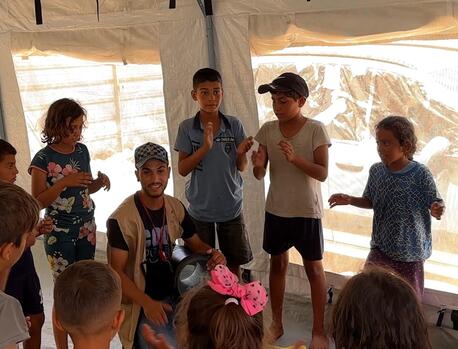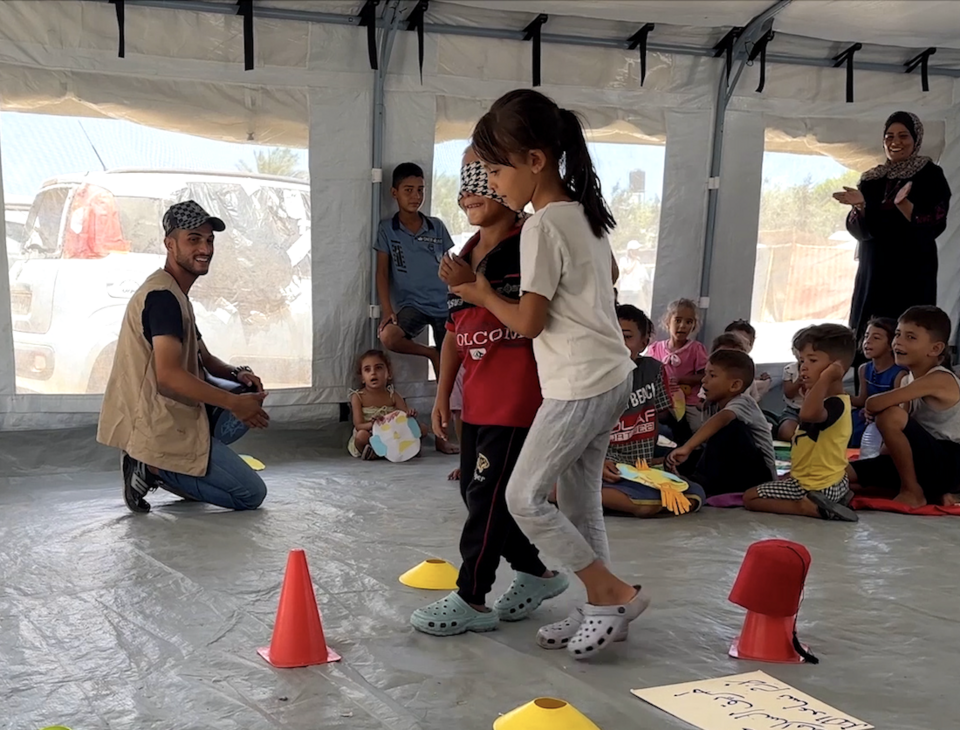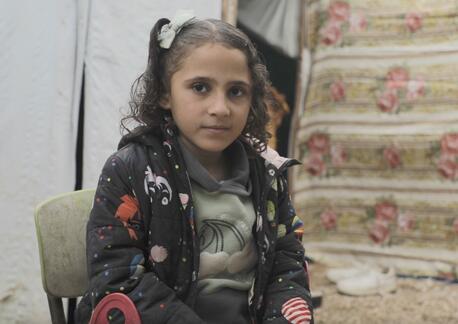
A Place Where Kids Can Learn and Grow in the Gaza Strip
UNICEF is working with partners to provide children with learning activities, psychosocial support and a chance to just be kids again.
Gaza's 625,000 students have missed an entire academic year
Inside a multi-purpose tent in Deir al Balah, a city in the central Gaza Strip, children learn, play games, sing songs and try to forget for a moment the constant threat of violence outside.
"Before the war, we used to wake up early, go to school, and wash our faces and teeth," says Orjwan, 10. "But now we study on the ground, inside a very hot tent."
"I wish everything could go back to how it was before the war," adds 10-year-old Tala. "I miss having proper school desks, chairs, schoolbooks and backpacks."
See inside a temporary learning space:
Children are yearning to return to school and a sense of normalcy
An estimated 1.9 million people — around 9 in 10 — are now internally displaced by ongoing conflict in the Gaza Strip. Half of them are children. School-age kids are eager to get back in the classroom, but an alarming 85 percent of Gaza's education infrastructure will require significant reconstruction before it can be used for learning again.
In July, UNICEF supported around 15,000 new learners through a variety of activities, including psychosocial support, recreational activities, awareness sessions and informal learning in Khan Younis, the Middle Area, Gaza City and North Gaza. More than ten new temporary learning spaces were established, bringing the total to 48: 28 in Deir Al Balah, 19 in Khan Younis and one in North Gaza.

UNICEF and partners provide informal learning activities and psychosocial support
"Ten months after the war in Gaza and the ongoing violence, all the children in the Gaza Strip are facing horrible difficulties on the emotional level," says UNICEF spokesperson Salim Oweis. "All the children in the Gaza Strip need mental health and psychosocial support, and that's what UNICEF and partner organizations are doing here, giving a little bit of respite, a little bit of normalcy to the children."
All the children in the Gaza Strip need mental health and psychosocial support, and that's what UNICEF and partner organizations are doing here, giving a little bit of respite, a little bit of normalcy to the children. — Salim Oweis, UNICEF spokesperson
"These activities help children to regulate their emotions, to be able to face a very hard and challenging life that they've been pushed to," Oweis says. "Children shouldn't face that kind and that level of violence. Children should be protected."
Since the onset of the war, UNICEF and partners have supported 365,000 students and teachers. Over 265,000 children, adolescents and caregivers have received community-based psychosocial support and counseling. More help is needed.
UNICEF won't stop working to ensure every child has a safe and happy childhood. Donate today.
Read the latest situation report to learn more about UNICEF's impact for children in the Gaza Strip.
HOW TO HELP
There are many ways to make a difference
War, famine, poverty, natural disasters — threats to the world's children keep coming. But UNICEF won't stop working to keep children healthy and safe.
UNICEF works in over 190 countries and territories — more places than any other children's organization. UNICEF has the world's largest humanitarian warehouse and, when disaster strikes, can get supplies almost anywhere within 72 hours. Constantly innovating, always advocating for a better world for children, UNICEF works to ensure that every child can grow up healthy, educated, protected and respected.
Would you like to help give all children the opportunity to reach their full potential? There are many ways to get involved.





